All the chicken behaviours, and which are instinctive or learned.
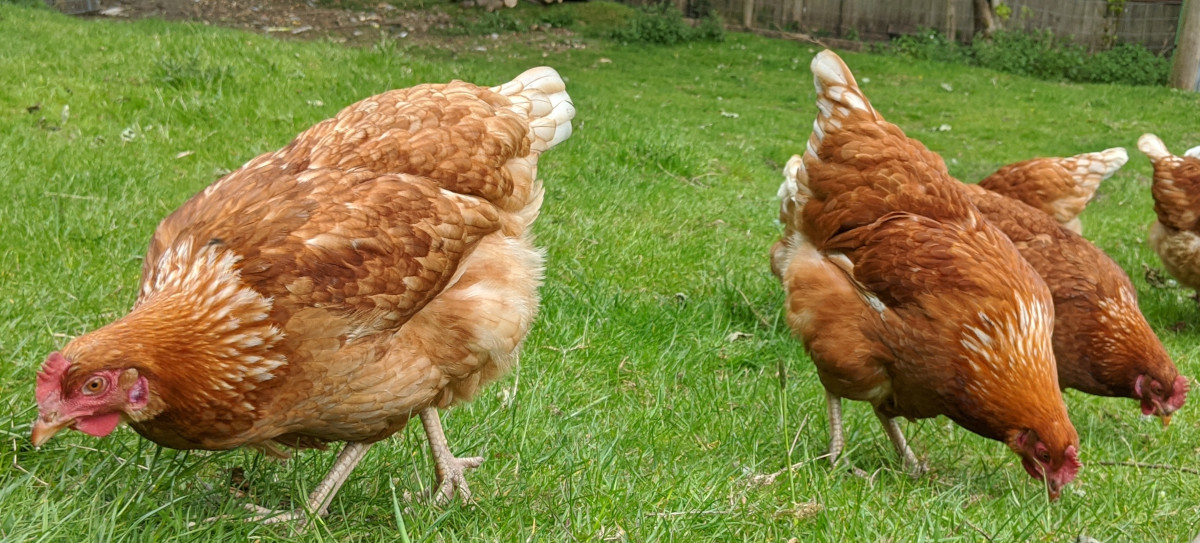
Table of Contents
What is the difference between instinctive and learned behaviours?
Not everything comes naturally to chickens and not all behaviours are completely instinctive or fully learned. Instinctive behaviours are also sometimes known as natural behaviours.
Those of us who remember our teenage years will agree that while mating is instinctive, the finer points of the act have to be learned.
Chickens are instinctive creatures that also have the capacity to learn. The instinctive parts of their behaviour are what have made them so easy to domesticate.
What are the instinctive or natural behaviours of a chicken?
Natural or instinctive behaviours are the innate actions that occur immediately when triggered where as learned behaviours take time and occur only after the actions have been learned through observation, education or experience.
Examples of instinctive behaviour in chickens are mating, dust bathing, pecking, preening and roosting.
There has been much research on chickens to determine which behaviours are instinctive and which are learned.
Below: Scratching is instinctive and chicks begin to scratch with a few days of hatching.
In one study, chicks were blindfolded immediately after hatching until they were three days old. Even though they could not see, these chicks instinctively preened themselves and scratched the ground.
Other research has shown that chicks instinctively avoid and are fearful of stinging insects but try to catch flies and when given a worm, these chicks ran away in case they were being chased by other chicks wanting to steal their food, even when they were alone.
Some behaviours have to be taught. Chicks instinctively peck, but until they learn what is good to eat and drink, they often peck at their own poop or the bedding until they learn not to.
Chicks that are raised without a hen often have to have their beaks dipped into water so that they learn to drink. When the chick senses water in the mouth it instinctively swallows and a drinking response is learned.
During the research, it was noted that chicks will not peck at water even if they are thirsty and standing in it although they will peck at shiny objects or bubbles in the water.
List of behaviours in chicks and chickens that are wholly or partly instinctive:
In no particular order of importance:
The main need of newly-hatched chicks is warmth. Research has shown that chicks will instinctively press against any source of warmth if they are cold and the source need not be a hen.
Below: Chicks huddling up to the heat source in the brooder.
Pecking is an instinctive behaviour that leads on to chickens learning how to eat and drink.
Preening is a grooming activity in poultry where the feathers are cleaned and realigned and waterproofed. It is important feathers are kept in good condition and to this end chickens of all ages spend time everyday preening.
Crowing is an instinctive behaviour in all male chickens beginning after 8 weeks of age. Even hens with damaged ovaries have been known to begin to crow.
Sunbathing is a particular favourite activity of my chickens. When they have had a good feed and forage in the mornings there is often a communal sun bathing session to be had. Sun bathing is an instinctive activity that all chickens seem to do.
Chickens have a desire to perch and roost from a very early age. From three weeks of age, chicks will start to jump up to higher perches and their feet are well designed for gripping round branches.
Below: A three week old Barnevelder chick perching.
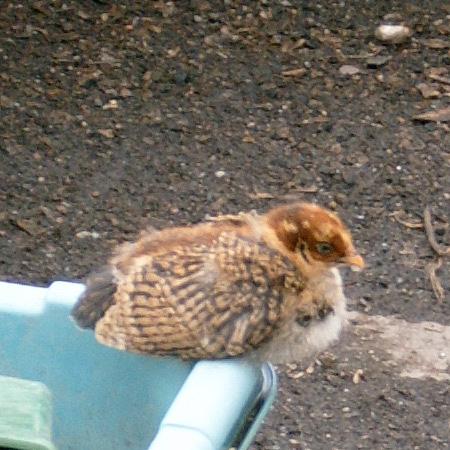
Natural behaviours are very important for chickens, if they cannot indulge they often begin to suffer stress.
Wing beating is practised by both the hens and cockerels and involves stretching upwards and beating the wings a dozen or times to produce a characteristic sound.
Below: A hen beating her wings.
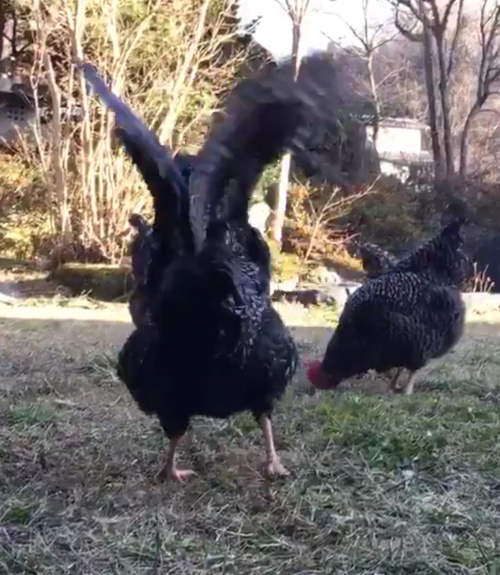
There are elaborate courtship rituals prior to mating in chicken society. The two most common are tit-bitting , when the cockerel finds a morsel of food and calls the hens over with a distinctive sound and the second is dancing around the hen clucking with one or both wings held low to the ground.
Reproduction Behaviour or mating is an instinctive action but with learned aspects. It's not uncommon to see you cockerels falling off the hens when trying to mate.
Research in 1935 by T. Schjelderup-Ebbe led to the discovery of a pecking order or a social hierarchy within flocks.
Newly hatched chicks do not show any competitive behaviour at all until after they are three days old. By the time they reach 16 days of age, fighting to determine where each bird sites in the pecking order begins.
Birds that form a social hierarchies, like chickens, often attack a new bird of the same species or breed that is introduced into the pen or cages.
Chickens are more sensitive to high temperatures than cold weather and the response to heat is instinctive.
Chickens can not sweat and cool themselves by heading into the shade, dunking their beaks in cold water or flapping their wings to air out their feathers. On very hot days I have seen mine stand in a water trough.
Fighting to defend territory or status in the pecking order begins at 3 weeks of age. Chicken society is built on the pecking order and places are fiercely contested.
Below: Occasionally this is directed at chicken keepers.
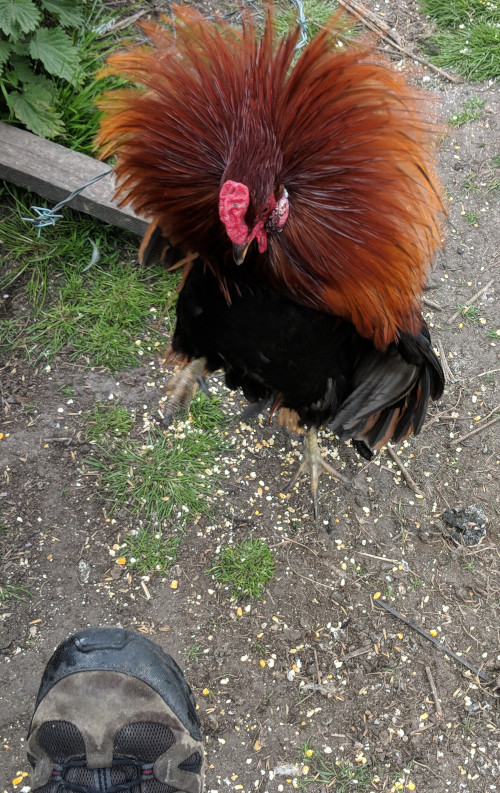
All chickens fight and this is instinctive. Some are better at it than others.
Cockerels are well known for scrapping and disagreements among the hens are mostly solved by a little squabble. The exception to this is a hen with chicks, they can be ferocious.
In the wild, jungle fowl spend a minimum of 60% of their time foraging and looking for food and domestic chickens are much the same. This is a hard wired action that all chickens do without and direction.
Below: Roaming chickens free ranging on pasture.
Many chicken breeds are naturally curious and roam over quite large areas. Roaming increases the area in which you can find food, water and roosting sites.
Nesting in secluded comfortable hens comes naturally to chickens. Nesting is an instinctive behaviour that all chickens
Dust bathing is the act of rolling or moving around in the dirt to cleanse the skin and feathers of parasites, dead skin, and other skin irritants. Chicks begin to dust bathe even when raised in isolation making dust bathing an instinctive characteristic.
Drinking is learned from pecking as a chick although the drinking is a reflex action.
Broodiness seems to be a hormonal state that brings about changes to the behaviour of the hen.
Below: Broodiness is a hormonal state but some hens make better mothers than others.
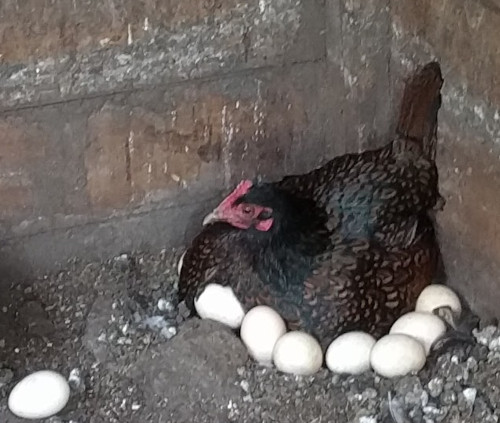
She only had 10 bantam eggs in her nest but they must have been uncomfortable.
Mothering and looking after chicks are instinctive to chickens, some are better at it than others and I have noticed that my hens often have more success on their second attempt at raising a family.
Feeding chicks is a natural behaviour for chicken mothers. The clucking sounds and the picking up and dropping of food for chickens happens regardless of whether the hen was raised artificially or not.
Below: A hen feeding her chick corn.
Can chickens learn? and how much?
Chickens do have the ability to learn. While much of a chickens’ behaviour is inherent or instinctive, they do have to learn in order to survive.
In "The private life of chickens" chickens were taught in just three short training sessions to distinguish shapes using food.
Below: Chickens learned to peck the circles and leave the stars.
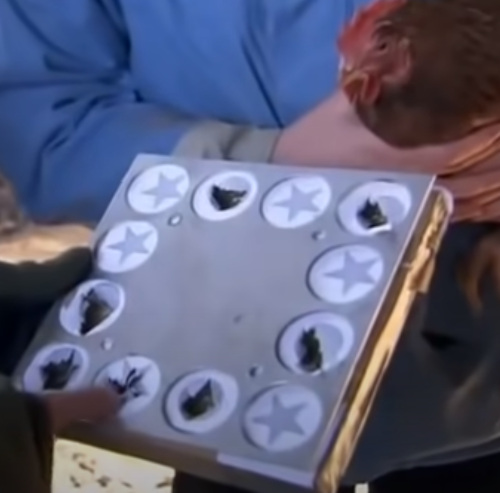
Individual chickens will copy others and this is an important part of the learning process.
When a chicken sees another pecking at something, it will copy, thus learning what to eat, and where to find food and water.
Chickens are often perceived as lacking the characteristics we recognise in other intelligent animals and are thought of as possessing a low level of intelligence.
Chickens recognise up to 80 other birds in the flock by appearance based on the shape of the comb, wattles, plumage colour and head.
Very abrupt or major changes result in a failure to recognise flock mates.
It has been shown that chickens forget each other fairly quickly. Flock mates that are separated forget each other within 3 to 4 weeks.
